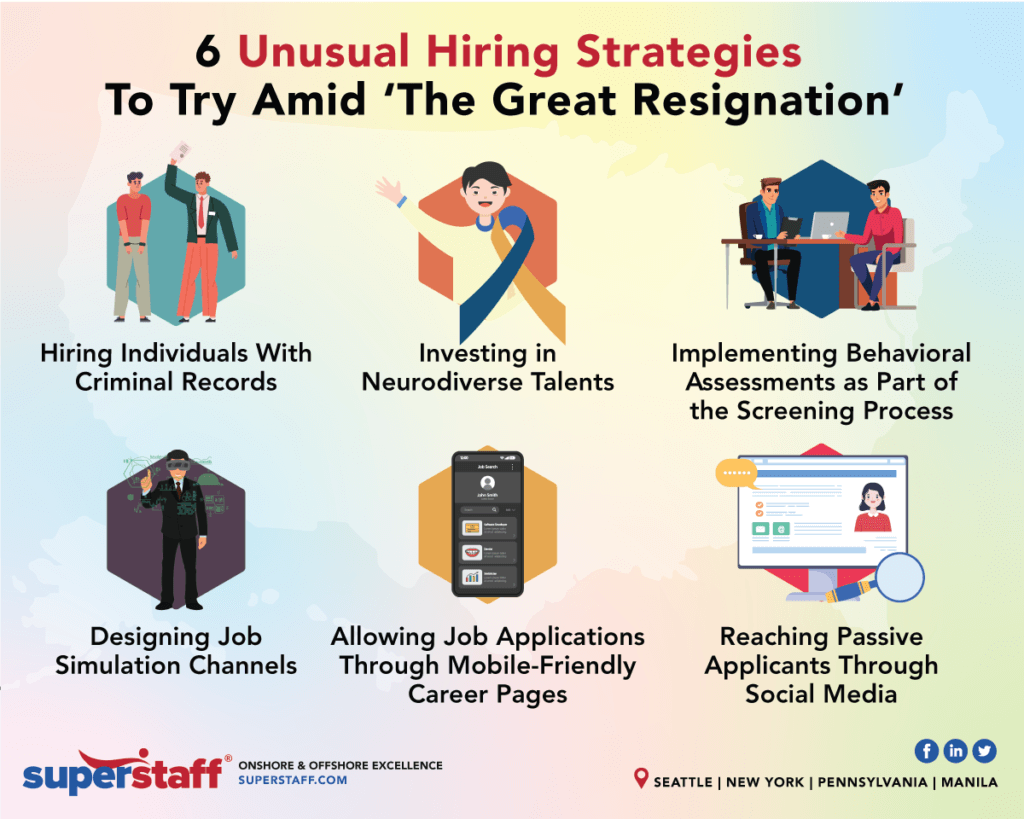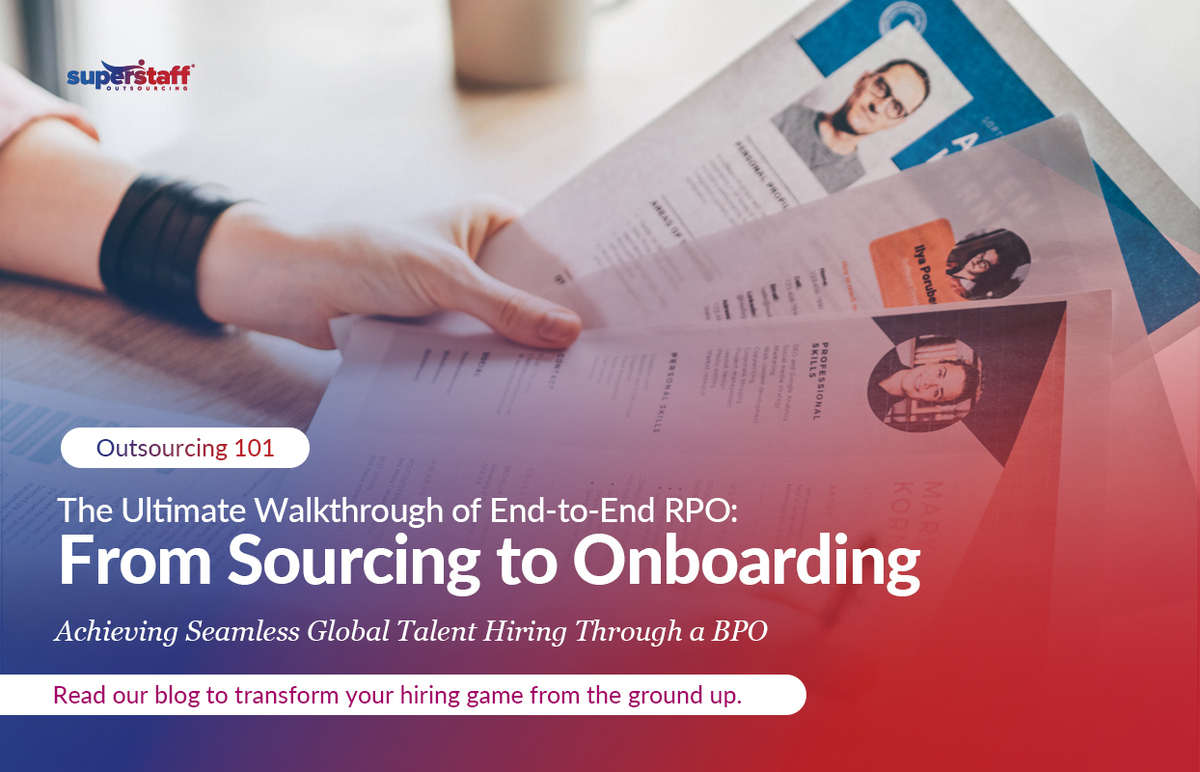
“The Great Resignation” continues to disrupt the business landscape. This unprecedented and much-talked-about phenomenon is still in full swing in 2022, with widespread job resignations still up 23% above the pre-COVID era.
Nearly 4.3 million Americans quit their jobs at the beginning of the year, creating significant labor gaps that businesses still have trouble filling. According to the Department of Labor’s latest survey, there are currently 11.3 million open job positions but only 6.5 million hires.
Amid the challenges caused by “The Big Quit,” what can companies do to attract more workers and fill crucial gaps in their workforce? One solution is to go beyond traditional hiring practices and utilize more unconventional approaches. This article shares a few unusual hiring strategies worth trying during “The Great Resignation.” Let’s dive in!
Why Investing in Unconventional Talent Can Benefit Businesses Amid ‘The Great Resignation’
Before discussing possible hiring practices you can implement during “The Great Resignation” wave, let’s discuss the advantages of hiring unconventional talent. Creating a workplace that welcomes and embraces diversity can offer plenty of value for businesses, especially since the U.S. labor market is the tightest in years.
A Focus On Potential Over History
The truth is that the skills that may seem ideal for one role today may no longer be a good fit after a year or more have passed. The business landscape is constantly changing, along with shifting market conditions and trends.
To remain competitive amid disruptions like “The Great Resignation,” companies must be ready to adapt and evolve. One way of doing this is by hiring unconventional talents who are skilled and have potential, even though they may not immediately seem like a perfect fit for specific roles.
Diversity Breeds Innovation
Innovation can be a significant competitive advantage in the age of “The Great Resignation.” And one benefit of hiring unconventional talent is that bringing together people from different backgrounds, cultures, and walks of life can drive innovation.
According to the Harvard Business Review’s research, having a diverse workforce leads to innovation because it creates an environment where non-traditional and “outside the box” ideas can be shared and heard.
Better Business Outcomes
In addition to fostering innovation and potential, investing in unconventional talent can also allow businesses to improve their profitability. One McKinsey study found that businesses that invested in gender and racial diversity in the workforce outperformed their competitors and enjoyed overall higher profits. So, if companies want to thrive amid “The Big Quit,” promoting diversity in hiring can be critical to their success.
6 Unconventional Hiring Strategies to Implement Amid ‘The Great Resignation’
Now that we’ve talked about the benefits of investing in unconventional talent, let’s get into a few hiring strategies your business can utilize as you navigate “The Great Resignation” wave:
#1: Hiring Individuals With Criminal Records
Historically, most businesses avoid hiring people with criminal records, fearing that it may make some staff members uncomfortable or hurt overall productivity. However, the truth is that 81% of business leaders found that individuals with criminal records have performed the same (or even better, in some cases) as employees without criminal records.
In the same vein, 76% of workers say they wouldn’t be uncomfortable working in a company that employs people with criminal records. Eliminating the barriers that keep individuals with criminal records from securing employment, also called “fair chance programs,” can help provide businesses with a competitive edge during “The Great Resignation.”
One company that found success with this unconventional hiring approach is JPMorgan Chase, a well-established New York-based bank. JPMorgan hired thousands of individuals by removing questions about criminal backgrounds in their initial job applications. By tapping into talent pools that have historically been left behind, the organization made exceptional progress in its recruitment and overall diversity initiative.
#2: Investing in Neurodiverse Talents
Approximately 85% of college-educated people with autism are unemployed. Compared to other people with disabilities, neurodiverse individuals had lower employment rates and higher social isolation rates. Despite being vastly underrepresented in the workforce, 60% of people with autism have average and above-average intelligence, with many even graduating college and having skills that are in high demand to employers.
These statistics show us that tapping into the neurodiverse talent pool can offer a wealth of advantages for businesses while also helping uplift an overlooked group of individuals brimming with potential. During “The Great Resignation” wave, where companies struggle to fill job vacancies, investing in neurodiverse talent can be a great way to bring traditionally underrepresented groups into the labor force and create a company culture that is truly inclusive and innovative.
One company that was able to expand its workforce through this hiring strategy is Dell Technologies. They created their Autism Hiring Program to help individuals on the spectrum be interviewed, trained, and hired remotely.
#3: Implementing Behavioral Assessments as Part of the Screening Process
Many companies implement skill tests as part of their screening process. While these tests are valuable in helping determine whether a candidate can perform particular tasks or job functions well, they cannot determine if the person has the suitable characteristics and temperament you want for the role. This is where behavioral assessments can come in handy.
One of the biggest problems facing companies during “The Great Resignation” era is having plenty of job openings but struggling to find workers who fit the role. Implementing behavioral assessments can help businesses make data-driven decisions instead of relying on guesswork, hire based on merit, and build teams with greater diversity by reducing bias in interviews.

#4: Designing Job Simulation Channels
“The Great Resignation” is not the only disruption changing the business landscape. New technologies and advancements are shaping the future of work, including in the recruitment field. One key innovation that companies can utilize in the hiring process is job simulation technology, a virtual workplace that allows applicants to perform actual job tasks and handle workplace issues.
Although a wide range of talent assessment tools exists, only job simulations can directly measure how well candidates can perform in the workplace instead of only measuring general abilities. Deloitte is one example of a company that utilizes job simulations during its application and hiring process.
#5: Allowing Job Applications Through Mobile-Friendly Career Pages
Mobile devices have become an essential tool for day-to-day living in the 21st century, and it’s no wonder that people also use their smartphones to find and land their dream jobs. In fact, most job searches are done through mobile devices, with 78% of millennials, 73% of Gen-X workers, and 57.2% of boomers all using mobile devices for job hunting.
If your business wants to get ahead during “The Great Resignation” wave, ensure that your website’s career page is mobile-friendly. Invest in a quality web development team that can make it easier for potential candidates to search for open job positions, submit resumes, and schedule interviews and assessments through your site.
Read More: Job Seekers’ Wishlist 2022: Top 7 Hiring Practices to Implement Amid ‘The Great Resignation’
#6: Reaching Passive Applicants Through Social Media
Social media channels used to be seen as a platform for sharing life updates with family and relatives, catching up with friends, and meeting new people and social groups. Today, social media has also become an essential tool for business, bridging the gap between a brand and its consumers.
Some job seekers go on social media to research companies and find job opportunities. Research has found that 92% of businesses use social media for hiring. Most job applicants (74%) use Facebook to manage their professional social media presence, while others use LinkedIn (56%) and Instagram (49%).
Amid “The Great Resignation,” businesses must utilize every platform available to attract workers and remain competitive in the tight labor market. Using social media to reach passive applicants can help brands boost their hiring and recruitment efforts.
Navigate ‘The Great Resignation’ Wave With Help From a Reliable BPO Provider
With “The Great Resignation” still in full swing, businesses must continue to explore every avenue to fill in labor gaps and retain quality talent. To help build your dream workforce amid disruptions in the job market, turn to the professionals at SuperStaff.
SuperStaff offers flexible and scalable outsourcing solutions that enable companies to meet every challenge efficiently and retain their edge amid uncertain market conditions. Whether you’re running a growing startup or a Forbes-ranked enterprise, you can trust our team to help you take your business to the next level.






